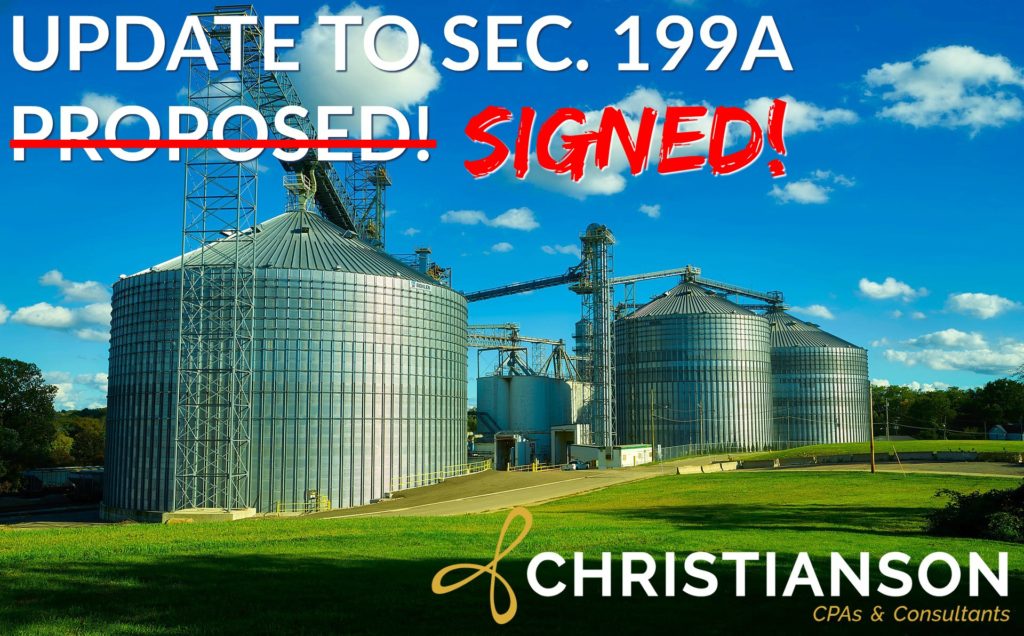As of today, March 23rd, 2018, the revision of Sec. 199A has been signed.
 The omnibus government-funding bill recently proposed in the House of Representatives contains amendments to Section 199A. Specifically, the proposed legislation amends the definition of “qualified business income (QBI)” by striking the exclusion for “qualified cooperative dividends.” This amendment replaces the current law QBI deduction with a deduction for qualified production activities income. That is similar to the pre-2018 DPAD.
The omnibus government-funding bill recently proposed in the House of Representatives contains amendments to Section 199A. Specifically, the proposed legislation amends the definition of “qualified business income (QBI)” by striking the exclusion for “qualified cooperative dividends.” This amendment replaces the current law QBI deduction with a deduction for qualified production activities income. That is similar to the pre-2018 DPAD.
The effect of the amendment is to change the farmer’s deduction to equal 20% of taxable income or qualified business income (including cooperative dividends in the computation). Limitations remain in place for farmers with high taxable incomes or capital gain income.
Special rules are to apply for farmers with respect to the qualified payments they receive from cooperatives. First, an amendment to Section 199A restores Section 199 treatment of the deduction to allow the cooperative’s patrons to claim the new 199A deduction that is passed through to them. Second, the farmer’s own 199A deduction is reduced by the lesser of (a) 9 percent of the qualified business income allocable to the qualified payments received from cooperatives, or (b) 50% of wages allocable to the trade or business conducted with the cooperatives. The reduction applies whether or not the Section 199A deduction is passed through by the cooperative. The farmer total 199A deduction is equal to the amount of the 199A deduction passed through from the cooperative plus the reduced 20% deduction on the farmer’s own qualified business income.
The amendments shall apply to taxable years beginning after December 31, 2017. These amendments will now require additional reporting for cooperatives to its patron members whether or not they allocate patron dividends on the 199A deduction to its patrons.
The amendment also excludes a cooperative exclusively engaged in the provision of supplies, equipment, or services to farmers or other specified agricultural or horticultural cooperatives from calculating the 199A deduction. In addition, the amendment clarifies transition rules for pre-2018 DPAD deductions allocated and received by patrons in 2018 allowing them to be deducted in 2018 but require this deduction to lower the 2018 199A deduction calculation.
If you have questions about the impact this revision will have on you or your organization, don’t hesitate to reach out to us today!
[button_1 text=”Contact%20Christianson%20Today!” text_size=”15″ text_color=”#ffffff” text_font=”Lato;google” text_letter_spacing=”1″ subtext_panel=”N” text_shadow_panel=”N” styling_width=”30″ styling_height=”20″ styling_border_color=”#ffffff” styling_border_size=”5″ styling_border_radius=”23″ styling_border_opacity=”100″ styling_gradient_start_color=”#1b335d” styling_gradient_end_color=”#1b335d” drop_shadow_panel=”N” inset_shadow_panel=”N” align=”center” href=”https://www.christiansoncpa.com/contact-us/”/]To read other content related to Sec. 199A as it went through it’s many stages, you can follow the links below:
- New Sec. 199A Deduction Impact on Cooperatives (Original outline of the Tax Reform Bill) (Published January 15, 2018)
- 199A Coop Deduction – What Do I Do Now? (Had a revision not been passed) (Published March 1, 2018)
- Sec. 199A “Grain Glitch” Fix Proposed (Published March 20, 2018)







